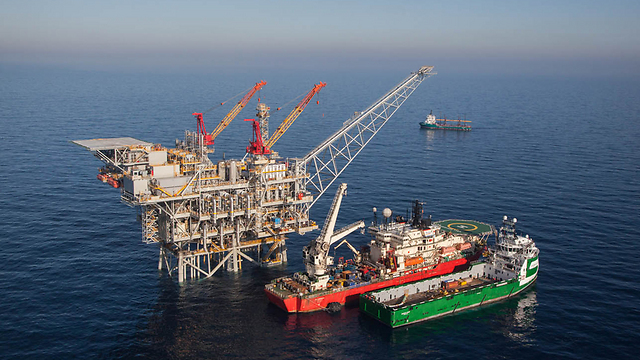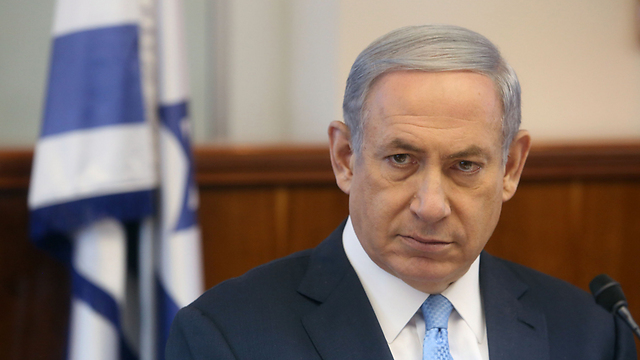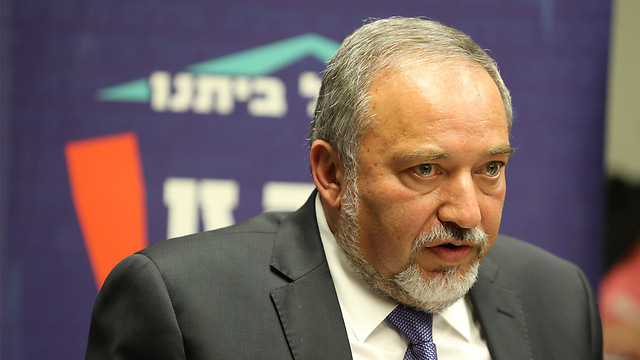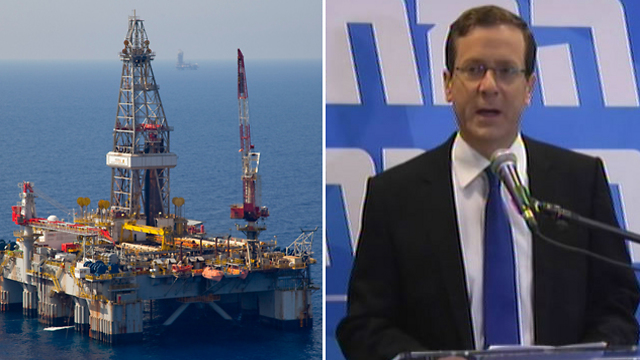
Netanyahu fighting to build majority for natural gas plan
With 3 cabinet members abstained from vote, the prime minister has no majority to pass legislation giving the government authority to approve a proposed plan for Israel's natural gas.
Prime Minister Benjamin Netanyahu on Monday faced his first major coalition crisis since his re-election, with ministers withholding support for government plans for developing Israel's natural gas fields. Netanyahu has ordered the plan to be released to the public in the near future as a result of the impasse.
At least three cabinet members cited conflicts of interest - personal or business-related - in seeking to be recused from a Knesset vote later in the day meant to pave the way for a gas deal that would circumvent anti-trust regulation.
Netanyahu, who has a one-seat majority in the 120-member Israeli parliament, held emergency meetings to try and resolve the impasse.
Under the proposed deal, Texas-based Noble Energy and Israel's Delek Group would keep ownership of the massive offshore Leviathan field while stakes in smaller projects are put up for sale, industry officials said.
The agreement has become the focus of national debate with critics saying Netanyahu was putting big oil profits above what could be a windfall for the state and citizens hoping to lower energy prices. Netanyahu says the more pressing issue is to get the gas out of the ground and fast-track the development of Israel's natural resources.
Netanyahu's original plan to push the deal through swiftly last week was derailed when his economy minister, Aryeh Deri of Shas, declined to sign off on the agreement, citing monopoly concerns.
That in turn forced Netanyahu to go to the Knesset in order to give the government the required authorization to finalize the deal with Noble and Delek, which currently control a number of gas fields off Israel's shore.
After learning that he had lost the majority needed to pass the decision – due to the abstention of the three cabinet ministers, and Lieberman's refusal to support the measure, Netanyahu choose to delay the vote.
As things currently stand, there is no majority to support the measure that would allow the government to approve the deal, which may lead the coalition to loose the dramatic vote.
With that in mind, people close to Netanyahu are enacting heavy pressure on Economics Minister Arie Deeri to sign the measure that would allow the government to bypass the anti-trust Commissioner and approve the gas plan. People close to Deeri say that even if the Knesset fails to approve the measure and it returns to him for signing – he will continue to refuse to do so.
Concurrently heavy pressure is being enacted on ministers; Kahlon, and Galant to change their stance, and participate in the vote. The pressure includes talks in the presence of the judicial advisor to the Knesset, Eyal Cohen, who advised the ministers that they are legally able to vote in the face of their abstention - due to conflicts of interest.
The opposition has already stated that in the case of a confidence vote, they will pursue a vote of no-confidence.
Anxious reaction
As a result of the clear lack of a majority and rising tensions, Netanyahu summoned key Knesset members to his office, including coalition chairman Tzachi Hanegbi, the minister in charge of communications between the government and the Knesset, Yariv Levin, and Knesset chairman Yuli Edelstein, in order to find a solution.In his opening remarks to a Likud party meeting Monday, Netanyahu said, "If I were to implement a populist economic policy, we would be in the same situation as Greece. We need to act responsibly. The gas plan is a good one. It breaks the monopoly. It streams hundreds of millions of shekels into the state's coffers, for education, welfare, health, and additional needs. This is the time to lead responsibly. We need to accept and accelerate the plan."
In a meeting of the Yisrael Beytenu party, leader Avigdor Lieberman said that although he thinks the plan is good, he will vote against its adoption.
"Back in the 18th Knesset, when Uzi Landau was energy and infrastructure minister, we were the only party to have all five of its ministers rebuff the Sheshinski report. Nothing is more important than developing the gas industry, and as such I support the current model with all my heart. The agreement is a good agreement," he said.
Lieberman added, however, that "No one wants to vote on this plan due to electoral reasons, and they expect that we will act as a ladder for them. We refuse to be suckers. We will not support the vote today. It's not about the plan, it's about the procedure. If the prime minister is anxious for the gas industry, he should order the economy minister to sign it."
Yisrael Beytenu MK Orly Levy-Abekasis, meanwhile, sent an urgent letter to the Knesset's legal adviser, Attorney Eyal Yinon, asking him to work to stop the vote at the plenum on the gas plan.
She urged him to demand the government to reveal all relevant information on the vote to members of the Knesset even before the vote itself was to take place.
Yesh Atid leader Yair Lapid said that his party will vote against transferring the authority to the government. "It is unacceptable that the most important economic debate of the last twenty years will happen in the shadows, without giving the Knesset the opportunity to examine the details."
"If there is a possibility to restrict prices, we will support the plan. Otherwise we will oppose the gas plan with all our power," he added.
Opposition chairman Isaac Herzog (Zionist Union) said that "Netanyahu is burying the Israeli public's gas in the shadows, far from view, his pockets and future. We are sick of rumors and half truths. What are Netanyahu and his government afraid of? If the secret plan is so good – the public would support it."
Herzog said that "Even Netanyahu doesn’t like it, the State of Israel is still democratic."
In turning to the members of the coalition, he said, "You are acting like a bunch of disciplined parrots, like soldiers in the army whose loyalty is unknown. Why are we not hearing you? What, are you all in a conflict of interest? How are you willing to vote without knowing what you are voting for?"
Development of Leviathan, which could supply billions of dollars worth of gas to Egypt and Jordan, has been held up for a few years by regulatory issues. Israel's anti-trust authority objects to the monopoly arrangement.
The US State Department, hailing prospective regional benefits, has voiced support for moving ahead with the deals between Noble Energy, Jordan and Egypt. US Secretary of State John Kerry has discussed the matter with Netanyahu in the past.














